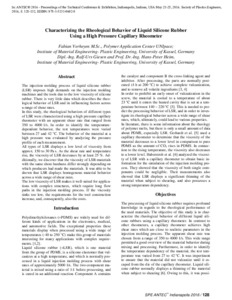Datum
2016Schlagwort
660 Chemische Verfahrenstechnik, Technische Chemie FließverhaltenSiliconkautschukFlüssigkautschukSpritzgießenKapillarviskosimeterMetadata
Zur Langanzeige
Konferenzveröffentlichung

Characterizing the Rheological Behavior of Liquid Silicone Rubber Using a High Pressure Capillary Rheometer
Zusammenfassung
The injection molding process of liquid silicone rubber (LSR) imposes high demands on the injection molding machines and the tools due to the low viscosity of silicone rubber. There is very little data which describes the rheological behavior of LSR and its influencing factors across a range of shear rates.
In this study, the rheological behaviors of different types of LSR were characterized using a high pressure capillary rheometer with an apparent shear rate that ranged from 350 to 4000 1/s. In order to identify the temperature-dependent behavior, the test temperatures were varied between 27 and 42 °C. The behavior of the material at a high pressure was evaluated by analyzing the pressure profile of each measurement.
All types of LSR displays a low level of viscosity from approx. 150 to 30 Pa s. As the shear rate and temperature rise, the viscosity of LSR decreases by at least 25 %. Additionally, we discover that the viscosity of LSR-materials with the same shore hardness differ strongly depending on which producers had made the materials. It was able to be shown that LSR displays homogenous material behavior across a wide range of shear rates.
The low viscosity of LSR makes it well-suited for applications with complex structures, which require long flow paths in the injection molding process. If the viscosity sinks too low, the requirements for the tool construction increase, and, consequently, also the costs.
In this study, the rheological behaviors of different types of LSR were characterized using a high pressure capillary rheometer with an apparent shear rate that ranged from 350 to 4000 1/s. In order to identify the temperature-dependent behavior, the test temperatures were varied between 27 and 42 °C. The behavior of the material at a high pressure was evaluated by analyzing the pressure profile of each measurement.
All types of LSR displays a low level of viscosity from approx. 150 to 30 Pa s. As the shear rate and temperature rise, the viscosity of LSR decreases by at least 25 %. Additionally, we discover that the viscosity of LSR-materials with the same shore hardness differ strongly depending on which producers had made the materials. It was able to be shown that LSR displays homogenous material behavior across a wide range of shear rates.
The low viscosity of LSR makes it well-suited for applications with complex structures, which require long flow paths in the injection molding process. If the viscosity sinks too low, the requirements for the tool construction increase, and, consequently, also the costs.
Zitierform
In: Society of Plastics Engineers (Hrsg.): ANTEC® 2016 - Proceedings of the Technical Conference & Exhibition, Indianapolis, Indiana, USA May 23-25, 2016. Society of Plastics Engineers: 2016, S. 128-132; isbn:978-0-692-71961-9, eisbn:978-1-5231-0602-8Zitieren
@inproceedings{doi:10.17170/kobra-202206026292,
author={Verheyen, Fabian and Giesen, Ralf-Urs and Heim, Hans-Peter},
title={Characterizing the Rheological Behavior of Liquid Silicone Rubber Using a High Pressure Capillary Rheometer},
booktitle={ANTEC® 2016 - Proceedings of the Technical Conference & Exhibition, Indianapolis, Indiana, USA May 23-25, 2016},
year={2016}
}
0500 Oax
0501 Text $btxt$2rdacontent
0502 Computermedien $bc$2rdacarrier
1100 2016$n2016
1500 1/eng
2050 ##0##http://hdl.handle.net/123456789/13911
3000 Verheyen, Fabian
3010 Giesen, Ralf-Urs
3010 Heim, Hans-Peter
4000 Characterizing the Rheological Behavior of Liquid Silicone Rubber Using a High Pressure Capillary Rheometer / Verheyen, Fabian
4030
4060 Online-Ressource
4085 ##0##=u http://nbn-resolving.de/http://hdl.handle.net/123456789/13911=x R
4204 \$dKonferenzveröffentlichung
4170
5550 {{Fließverhalten}}
5550 {{Siliconkautschuk}}
5550 {{Flüssigkautschuk}}
5550 {{Spritzgießen}}
5550 {{Kapillarviskosimeter}}
7136 ##0##http://hdl.handle.net/123456789/13911
<resource xsi:schemaLocation="http://datacite.org/schema/kernel-2.2 http://schema.datacite.org/meta/kernel-2.2/metadata.xsd"> 2022-06-08T12:39:26Z 2022-06-08T12:39:26Z 2016 doi:10.17170/kobra-202206026292 http://hdl.handle.net/123456789/13911 eng Society of Plastics Engineers Namensnennung 4.0 International http://creativecommons.org/licenses/by/4.0/ 660 Characterizing the Rheological Behavior of Liquid Silicone Rubber Using a High Pressure Capillary Rheometer Konferenzveröffentlichung The injection molding process of liquid silicone rubber (LSR) imposes high demands on the injection molding machines and the tools due to the low viscosity of silicone rubber. There is very little data which describes the rheological behavior of LSR and its influencing factors across a range of shear rates. In this study, the rheological behaviors of different types of LSR were characterized using a high pressure capillary rheometer with an apparent shear rate that ranged from 350 to 4000 1/s. In order to identify the temperature-dependent behavior, the test temperatures were varied between 27 and 42 °C. The behavior of the material at a high pressure was evaluated by analyzing the pressure profile of each measurement. All types of LSR displays a low level of viscosity from approx. 150 to 30 Pa s. As the shear rate and temperature rise, the viscosity of LSR decreases by at least 25 %. Additionally, we discover that the viscosity of LSR-materials with the same shore hardness differ strongly depending on which producers had made the materials. It was able to be shown that LSR displays homogenous material behavior across a wide range of shear rates. The low viscosity of LSR makes it well-suited for applications with complex structures, which require long flow paths in the injection molding process. If the viscosity sinks too low, the requirements for the tool construction increase, and, consequently, also the costs. open access Verheyen, Fabian Giesen, Ralf-Urs Heim, Hans-Peter Fließverhalten Siliconkautschuk Flüssigkautschuk Spritzgießen Kapillarviskosimeter publishedVersion 2016-05-23 Indianapolis ANTEC® 2016 - Proceedings of the Technical Conference & Exhibition, Indianapolis, Indiana, USA May 23-25, 2016 Society of Plastics Engineers isbn:978-0-692-71961-9 eisbn:978-1-5231-0602-8 128-132 false ANTEC 2016 </resource>
Die folgenden Lizenzbestimmungen sind mit dieser Ressource verbunden:


